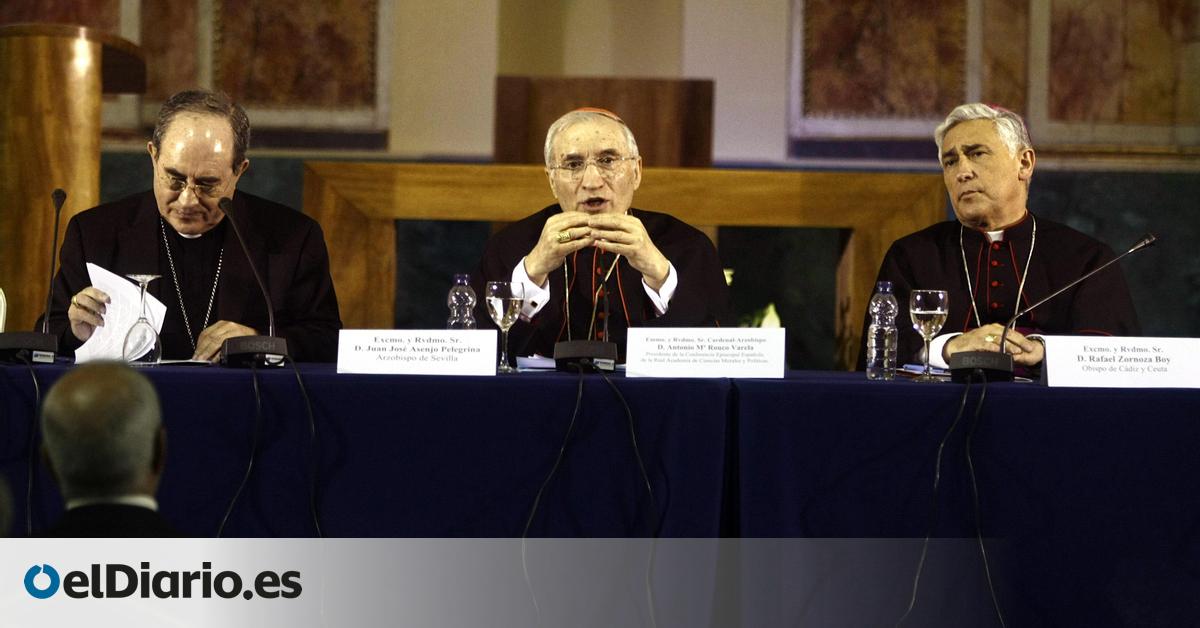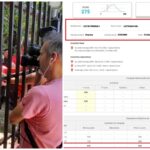
Rafael Zornoza is on his way out. In fact, the still bishop of Cádiz and Ceuta has been extended for a year and a half after turning 75 on July 31, 2024 and presenting the mandatory resignation to the Holy See. A resignation that, at the time, was not accepted, to the displeasure of a good part of those responsible for the Spanish Church, especially after it became known that the Vatican has ordered a canonical investigation before deciding whether to open a process against the prelate, following the complaint of abuse by a victim for events that took place three decades ago, while Zornoza served as rector of the Getafe Seminary.
“It is not the same that the accusations are against an emeritus bishop than against a practicing prelate,” several prelates point out to elDiario.es. Canon experts claim to “not explain” why precautionary measures have not been taken against Zornoza four months after the complaint reached the dicastery for the Doctrine of the Faith. Something that seems could change in the coming weeks. As this newspaper has learned, the replacement of the bishop of Cádiz and Ceuta could occur shortly. Even before the arrival of the new nuncio in Spain, Piero Pioppo, scheduled before Christmas. In ecclesiastical lies there is talk of the bishop of Guadix, Francisco Jesús Orozco, as a substitute for the denounced prelate.
Be that as it may, the experts’ feeling is that any measure taken once the scandal is known “is already too late.” And, once Rome received the complaint (the victim did not trust any of the reporting bodies managed by the dioceses or the Episcopal Conference itself), a procedure was activated that should have led the archbishop of Seville – the diocese of Cádiz is a suffragan of that of Seville – to open an investigation. However, José Ángel Sáiz Meneses recused himself, then passing the case to the Tribunal de la Rota. Spain is the only country that has a court of this type, which depends on the Nunciature. This court is the one that, from now on, will have to take statements from those affected and decide if there is a basis to open a canonical process against the prelate, the first Spanish bishop formally accused of sexual abuse of minors. Also, it is the Rota that should impose precautionary measures once the case is made public.
For the moment, instead, silence reigns both in the Vatican and in the diocese of Cádiz, which limited itself to describing the accusations as “very serious and false,” and to inform that Zornoza is “temporarily suspending his agenda to clarify the facts and to attend to the treatment of an aggressive cancer that he is receiving.” An illness that no one knew anything about until the moment El País published the complaint of abuse.
And what does the Episcopal Conference say? Officially, silence and “respect” for the procedures. This Monday afternoon, the president of the EEC, Luis Argüello, considered the complaint against Zornoza “plausible”, although he asked to respect the presumption of innocence of the accused. “The fact that the Holy See has initiated the investigation gives credibility to the accusation,” stressed the archbishop of Valladolid, who asked “to get closer to the pain of a possible victim and the pain of a bishop, who could have been falsely accused.” Argüello did point to the possibility that Rome will soon accept his resignation: “The possibilities are high, but it does not depend on me or the Conference.”
For his part, the vice president of the episcopate, José Cobo, indicated this Tuesday his “confidence” that the Tribunal de la Rota “will resolve with the speed that the investigation demands.” Cobo has assured that the fact that the Vatican has decided to investigate Zornoza for an alleged crime of sexual abuse against a minor when he was a priest in Getafe in the 1990s is because “there has to be verisimilitude” and he has been convinced that the investigation will be “very exhaustive and very effective.”
What crimes could Zornoza face? In addition to the alleged sexual abuse, the complaint also speaks of misuse of the sacrament of confession, as well as a clear example of ‘spiritual abuse’ that, as elDiario.es announced, the Pope wants to sanction as a crime in the Code of Canon Law. Penalties that could lead to losing priestly status and even, in the most extreme cases, excommunication.
A new system of reparation for victims
In the midst of this new scandal, the Minister of the Presidency, Félix Bolaños, committed this Tuesday to the associations of victims of clerical pedophilia to create a mixed Church-State system, with the participation of the victims and reparations borne by the Church, during a meeting he held with 22 representatives of associations of victims of abuse.
The meeting, described by both parties as “productive and trustworthy”, takes place after the Government and the Church have begun a negotiation process in order to find answers for a comprehensive reparation system. During the meeting, a proposal was explained to the victims that complies with the recommendations of the Ombudsman, who will have a determining role in the procedure, having the last word. That is: a mixed Church-State system in which it is the Church that pays reparations, in which the victims participate, with voice and vote, and where the State is the guarantor of compliance.
Throughout the meeting, Minister Bolaños reiterated the Government’s commitment to the survivors of pedophilia to “continue dialogue with the Catholic Church” to “reach agreements that meet their historical demands”, as well as to inform them of all the progress that occurs. For their part, the victims (a total of 22) demanded from the minister the urgency of a formal and definitive response for the survivors. “The Government remains committed. The Priva plan continues to be a failure,” some of them declared. “We victims cannot take it anymore,” they stressed.
All the information at www.religiondigital.org
Source: www.eldiario.es

